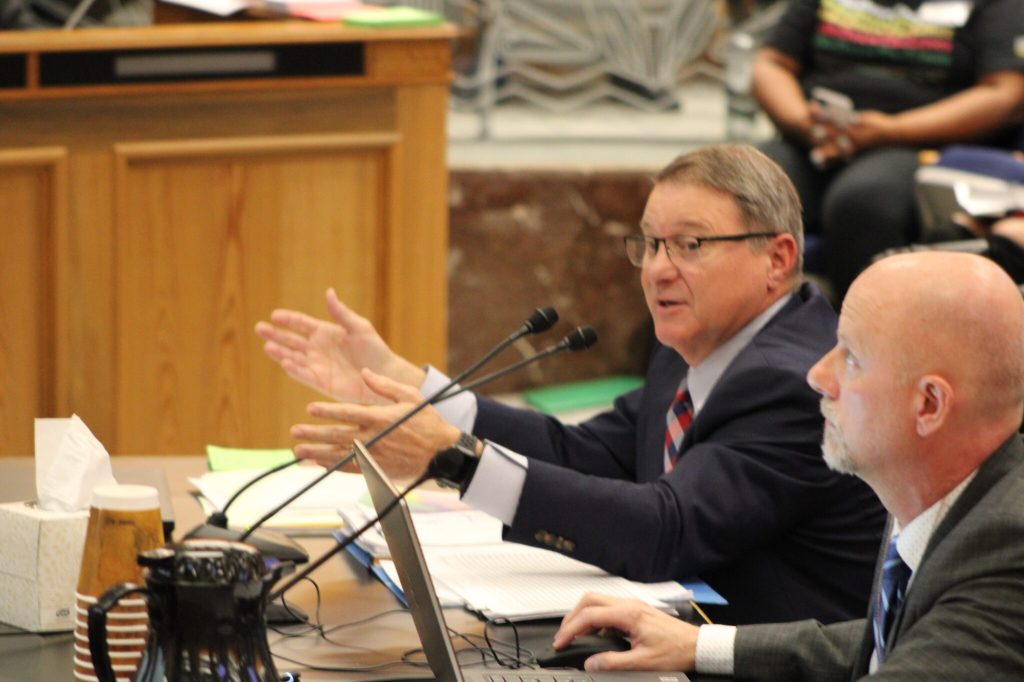Louisiana Senate to move budget to House, split on spending cap
Published 12:42 pm Sunday, June 4, 2023

- Louisiana Senate President Page Cortez, left. (Greg LaRose/Louisiana Illuminator)
The Louisiana Senate budget proposal released Friday will include pay raises for teachers and other public school staff as well as more funding for colleges and universities. But hundreds of millions of dollars will be yanked out of state construction projects unless the Louisiana House agrees to increase the state’s spending cap, Senate President Page Cortez, R-Lafayette, said Thursday evening.
“I think you’re going to see that we’re going to — very likely to stay under the expenditure limit — have to pull a large amount of the surplus out of [the state construction plan],” Cortez said.
The Senate Finance Committee will unveil a budget Friday that incorporates a $2,000 annual pay raise for public school teachers and $1,000 annual raise for other school staff, costing the state about $200 million per year. It will also include $61 million for “differential” school pay, funding that can be used to boost salaries for hard-to-fill teaching positions like those in science, math or at schools with low-income populations.
The Senate committee will also restore an across-the-board $95 million cut to state government agencies imposed in the budget plan the Louisiana House approved. State colleges and universities will also receive an extra $57 million that Gov. John Bel Edwards’ originally proposed but that House members had removed, Cortez said.
The Senate will face constraints when it comes to other spending, especially after including a big-ticket item like teacher pay raises. Louisiana lawmakers have an unprecedented amount of money available, but a constitutionally imposed spending limit places restrictions on how much of it they can access this year.
The spending cap limits lawmakers to increasing state expenditures by just $960 million over the next 13 months, well below the $2.2 billion in extra revenue the state is expected to have. If it stays in place, much of that money will go toward paying off state debt and into savings accounts for use in future years.
The governor and senators — many of whom are term-limited and won’t be in office next year — favor lifting the spending cap by $2.3 billion to allow legislators to use the additional revenue now. But it’s not clear they can convince enough House members to vote to do so before the legislative session ends Thursday.
The House leadership appears to be comfortable with increasing the spending limit, but many conservative House Republicans are not. Exceeding the spending cap will require a two-thirds majority in the lower chamber.
House Speaker Clay Schexnayder, R-Gonzales, struggled to even get legislation to breach the spending cap sent to a House committee this week. It took two days to convince House conservatives not to block a hearing on the spending limit. Even then, Schexnayder had to promise not to push forward with a vote on the spending cap until next week, after the Senate budget plan has been sent to the House.
House members were frustrated the Senate had not released details of its budget plan as of Thursday, with just a week left in the legislative session to go. Conservative representatives said they weren’t willing to entertain a vote on raising the spending limit until the Senate provided more detail regarding how that money would be used.
“Why are we in the House the only ones who have to rush this process? Why are we still waiting on [the budget bills] from the Senate?” House Republican Caucus Chairman Blake Miguez of New Iberia said on the House floor Wednesday. “This is not a one-chamber Legislature.”
The Senate is scheduled to release initial details Friday when its Finance Committee is expected to mark up and advance the budget bills. They’re expected to forward two versions of the spending plan — one they would use if the spending cap stays in place and another if the cap was lifted.
Cortez said the Senate wants to put more money into roads, bridges, university campuses and coastal restoration. They would like to add funding for a new roof fortification program, ports and the Water Sector Commission, which gives out grants to local water and sewerage systems for upgrades.
The governor and senators also want to put more money into an incentive program meant to lure homeowner insurance companies into the Louisiana market, which already received $45 million earlier this year.
Not all of those priorities can be funded if the spending cap is not lifted, Cortez said.
“Those things would probably not apply to the regular budget because we can’t fit all of that in there,” he said Thursday. “It could be a billion dollars of good things you could do if you raise the expenditure limit.”




